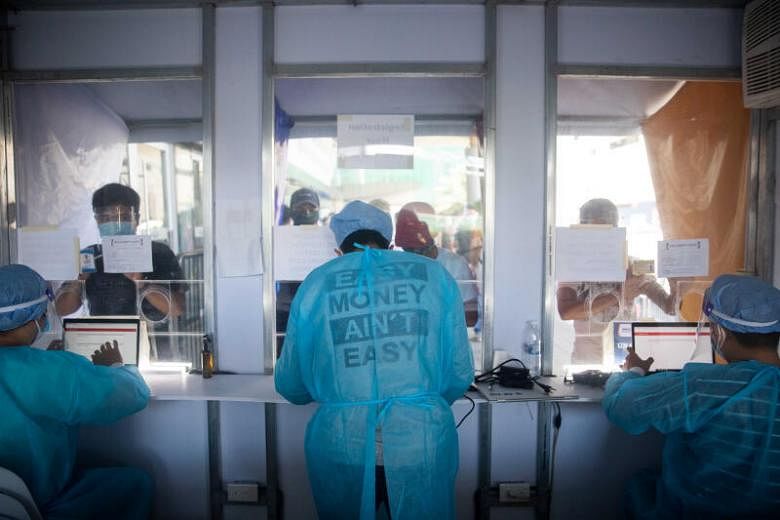MANILA (PHILIPPINE DAILY INQUIRER/ASIA NEWS NETWORK) - According to the Department of Budget and Management (DBM), the proposed P4.5 trillion ($126 billion) national budget for 2021 will "focus on containing the spread and mitigating the effects of the coronavirus while restarting the economy to help the nation reset, rebound and recover'' from the pandemic.
"It will sustain and strengthen efforts to bolster the health care system, ensure food security, invest in physical and digital infrastructure, and provide support and protection for the most vulnerable and affected sectors of society,'' it said further.
With thousands of Filipinos continuing to contract Covid-19 every day and with the economic crisis likely to be felt even worse next year, it is only expected that health expenditures would be given the highest priority in the division of the national pie.
And yet, it seems the DBM does not put its money where its mouth is. The proposed 2021 budget, with its bewilderingly skewed priorities, is proof.
For all its moist-eyed rhetoric about fighting the pandemic and shoring up the country's health care system, the DBM has in fact allotted a lower budget for the Department of Health (DOH), the agency at the forefront of fighting Covid-19 while still keeping tabs on other communicable diseases and public health issues.
Under the national budget now under deliberation in the House and the Senate, the DOH has been allocated a total of P203.1 billion, which includes P71.4 billion for the National Health Insurance Program (NHIP) to be administered by the scandal-plagued Philippine Health Insurance Corp or Philhealth.
Outside of the P71.4 billion NHIP budget, meant to fund the government's program to provide health insurance coverage for all Filipinos, the DOH is left with a P131.7 billion budget for 2021.
It bears emphasising that this amount is P20 billion lower than the department's current budget of P151 billion.
Given the DBM's profuse homage to containing the health crisis as justification for the highest-ever national budget, how does it plan to "bolster the health care system" with this egregious cut?
The DOH budget covers the purchase of personal protective equipment (P2.7 billion), Covid-19 vaccine (P2.5 billion), and GeneXpert cartridges (P1 billion), as well as assistance to indigent patients (P17.3 billion), and a health facilities enhancement program (P4.8 billion).
Of the 10 departments with the biggest allocations in the 2021 budget, health ranks only fifth, after education (P754.4 billion), public works (P667.3 billion), interior and local government (P246.1 billion), and national defense (P209.1 billion).
After DOH, the other departments with the biggest budgets are social welfare, transportation, agriculture, the judiciary, and labour.
As with the DOH, the critical sector of agriculture also suffered a major cut in its 2021 budget, despite being the lone bright spot during the pandemic with its positive growth.
Similarly, the Department of Science and Technology saw the budget for its research and development centres slashed by P76 million, which would adversely affect its cancer research program.
So why the huge allocations for programs that do not have the life-and-death urgency of the health system?
For instance, P19.1 billion for the National Task Force to End Local Communist Armed Conflict, which, along with the massive budgets for the military and the police, only serves to highlight the administration's fixation on the drug war and perceived enemies of the state in the middle of not only the worst health crisis, but also a record economic decline, in the country's history.
The intelligence and confidential funds for the President? They're also set to receive P4.5 billion, which Senator Panfilo Lacson described too modestly as "a bit too much."
It's not as if the many problems besetting the health system happened only during this pandemic.
Even in the best of times, the country's public health system has always been underfunded, resulting in the lack of doctors, nurses, hospitals, health care centres, medicines, and many other inequities that the Covid-19 outbreak only magnified.
And yet, despite a headline-grabbing order from the President in 2019 to cleanse PhilHealth, for instance, corruption in the agency continued, with an estimated P15 billion stolen from its coffers by a "mafia" said to include officials of the agency's executive committee.
The lack of health care workers, protective equipment, hospital rooms, and ICU facilities, not to mention the country's inability to produce vaccines or drugs for the ongoing crisis- all that can be traced to the criminally low priority given to funding the rickety national health care system, an anomaly the 2021 budget only perpetuates.
This budget, as it stands, is a manifestly unhealthy measure for a country already requiring emergency care.
The Philippine Daily Inquirer is a member of The Straits Times media partner Asia News Network, an alliance of 24 news media organisations.

